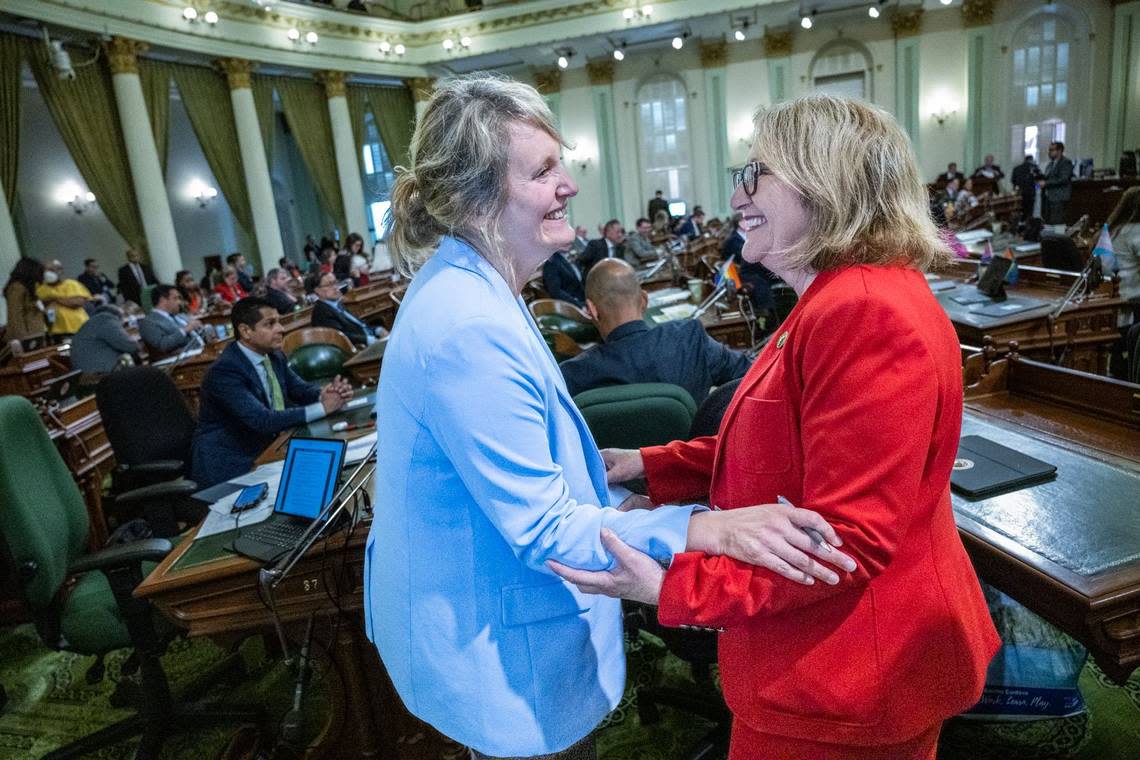California bill makes Big Tech pay for news. Why tech companies call it a government handout

In less than two weeks, Assembly Bill 886 — the California Journalism Preservation Act — will be heard in the Senate Judiciary Committee.
The bill reemerged this week with amendments aimed at making it more palatable to critics including the tech industry, which would be taxed for news links shared on their platforms. Big Tech is continuing to make its displeasure with the bill known.
AB 886 is set to be heard in committee on June 25.
Google and Meta, the two primary targets of the bill, declined to comment to The Sacramento Bee. However, NetChoice, a group that represents both companies, released a statement Tuesday.
NetChoice Vice President and General Counsel Carl Szabo framed the bill not just as bad for the tech industry, which he represents, but also for the free press itself.
“With AB 886, the free press in California hangs in the balance. If enacted, journalists will unquestionably face new financial pressures from government officials and politicians to report favorably on them or lose funding, further undermining the public’s trust in news media,” Szabo said in a prepared statement.
Brittney Barsotti, of the California News Publishers Association, said that NetChoice was introducing “red herring” arguments about the bill.
What does AB 886 do?
If AB 886 were to become law, tech companies like Google and Meta would have to pay for accessing, crawling, indexing and displaying news links that appear on their platforms.
The bill applies to companies with online platforms with at least 50 million monthly U.S. users, with a market capitalization greater than $550 billion and at least 1 billion users worldwide.
Under the bill, the companies would either be required to enter into arbitration with California news organizations to agree on a journalism usage fee or pay directly into a fund that would be distributed to news outlets, based on how many journalists are employed. The bill specifically requires that payouts should be made only for reporters who are employed for the specific purpose of covering California news.
In order to ward off criticism that the bill would benefit only billionaire media moguls, 1% of the funds collected would be distributed specifically to small news organizations, including many ethnic media outlets, on top of the money they already would receive.
News organizations would be required to spend 70% of the money to pay journalists and other staffers. For publications with five or fewer employees, that threshold would drop to 50%. They also would be allowed to consider freelancers and part-time employees as employees for the purposes of the bill.
NetChoice’s argument
In his statement, Szabo warned that AB 886 would defang the independent news media.
“California’s government through AB 886 would make the press dependent on government handouts, terminating the independence and credibility of news organizations based in the Golden State,” he said.
He added that free access to news online and on social media would significantly decrease — largely due to platforms like Google and Facebook removing news links from their sites — and that “cronyism will increase.”
The NetChoice release contained a number of inaccurate statements.
▪ It said that AB 886 doesn’t recognize freelancers as employees for the purposes of the bill. While that is true for large publications, organizations with five or fewer employees may count freelancers as employees for the purposes of the bill.
▪ The release contends that the bill would affect sites like Reddit and Pinterest. However, neither company would qualify under the language of the bill.
▪ It said that the bill would create a new government claims administrator to decide who is a news outlet and who is not. The bill does not create any new position, and it is the legislation, not the claims administrator, that determines which news outlets are eligible.
▪ The statement said the bill would not result in journalists seeing any more pay, “as the money their news corporation would receive is ultimately fungible.” However, the bill contains language requiring participating news outlets to publish reports about how the money they receive is being spent.
Supporters’ arguments
The Bee reached out to the author of AB 886, Assemblywoman Buffy Wicks, D-Oakland. She did not respond before deadline.
Barsotti said that the bill contains “robust reporting requirements” for news outlets, in order to prevent them from just shifting money around.
She disputed the argument that AB 886 would make the media beholden to the government.
“Our bill just creates a table that the platforms and the publishers have to come to,” she said.
She added that the government is stepping in to create that table because of the power of the tech companies and their refusal to come to the table otherwise.
“All the government is doing is saying, ‘Platforms who have immense power, you have to come to the table.’”
Martha Diaz-Aszkenazy, publisher of the San Fernando Valley Sun/El Sol, released a prepared statement that AB 886 was designed to help publications like hers. She disputed Szabo’s assertion that the bill is a threat to the free press.
“As the publisher of a local, ethnic publication, I can say with complete certainty that the most dire threat to the free press are large monopolies like Google, who exploit the work of hardworking newsrooms without paying a dime for our journalists’ content,” she said.
McClatchy, the parent company of The Sacramento Bee, The Fresno Bee, The Modesto Bee, San Luis Obispo Tribune and Merced Sun-Star, supports AB 886.


